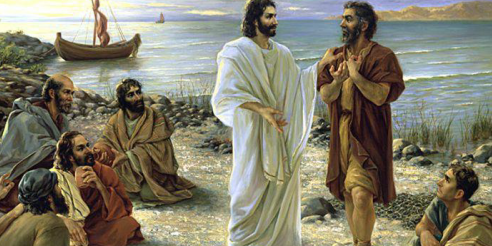

1. Introductory prayer
I calm down and I feel the presence of God in me. I ask for the grace of the Holy Spirit to open the word of God, I accept it and allow it to fulfill my mission in me, in order to become more and more what I am in Holy Trinity. Then I ask God for this prayer, in my own words, or with those that are here…
The Lord asks me who He is to me. He wants an answer from me because faith is something personal. When we fear Him or want it to be our way for God to follow our ideas, we prefer to resort to religion. As if God was dead. But He is not, He is very much alive, always beyond what we can imagine. And to know Him alive is grace. If we surrender to Him, He guides us. Lord, I ask you for mercy to recognize you as alive. So instead of drawing from my own, I will let your will flow through me.
2. Reading – Listening: You are the Messiah the Son of the living God – Matthew 16 13 20 Commentary
Peter Declares That Jesus Is the Messiah
13 When Jesus came to the region of Caesarea Philippi, he asked his disciples, “Who do people say the Son of Man is?”
14 They replied, “Some say John the Baptist; others say Elijah; and still others, Jeremiah or one of the prophets.”
15 “But what about you?” he asked. “Who do you say I am?”
16 Simon Peter answered, “You are the Messiah, the Son of the living God.”
17 Jesus replied, “Blessed are you, Simon son of Jonah, for this was not revealed to you by flesh and blood, but by my Father in heaven.
18 And I tell you that you are Peter,[a] and on this rock, I will build my church, and the gates of Hades[b] will not overcome it.
19 I will give you the keys of the kingdom of heaven; whatever you bind on earth will be[c] bound in heaven, and whatever you loose on earth will be[d] loosed in heaven.”
20 Then he ordered his disciples not to tell anyone that he was the Messiah.
See also:
- 14 Stations of the Cross explanation with pictures
- The Crucifixion of Jesus – Good Friday Message and Meaning
3. Thoughts on the Gospel – You are the Messiah the Son of the living God – Matthew 16 13 20 Commentary
Jesus asks for people’s opinions about him. The answers are very diverse. When he asks his disciples for their opinion, Peter becomes their representative and says, “You are the Messiah, the Son of the living God!” Peter’s answer says that he recognized in Jesus the fulfillment of the Old Testament prophecy and that in him is the final revelation of the Father for us. This confession of Peter is not new. This was stated earlier by other disciples (Mt 14:33) and also by Martha (Jn 11:27).
Jesus proclaims Peter blessed because he received a revelation from the Father. This answer of his is not new either. He declared his disciples happy because they had seen and heard things no one had seen before (Mt 13:16), and he celebrated Father because he revealed Him to the little children (Mt 11:25). And here Peter is one of those little children to whom the Father reveals himself. The perception of God in Jesus is therefore a pure free gift of God.
Simon, who is given the new name Peter, is called the rock, the sure foundation of the Church. “Being a rock” recalls the word of God given to the Jews when they were in exile in Babylon:
“Listen to me, you who pursue righteousness
and who seek the Lord:
Look to the rock from which you were cut
and to the quarry from which you were hewn;
2 look to Abraham, your father,
and to Sarah, who gave you birth.
When I called him he was only one man,
and I blessed him and made him many. «(Isaiah 51: 1-2). Now this parable is applied to Peter, on whom the new people of God will be built. The New Testament also describes the Church as a spiritual house or temple in which each member is a living stone (1 Pt 2,5). Faith in Jesus Christ makes Christians for rocks or spiritual stones.
Peter receives the keys of the kingdom with which it can bind or unbind, thus reconciling persons with one another and with God. This same power of binding and unbinding was given to other disciples (Jn 20:23) and their communities on another occasion (Mt 18:18). The Gospel of Matthew repeatedly points to the importance of forgiveness and reconciliation (Mt 5-6). In the 1980s and 1990s, there was a lot of tension in communities and family disagreements in Syria over faith in Jesus. For Matthew, reconciliation was one of the most important tasks of the Church. Everything possible must be done to bring about reconciliation, mutual acceptance, the establishment of true brotherhood (Mt 18:22).
The word Church (Gr. Ecclesia) appears 105 times in the New Testament, almost exclusively in the Acts of the Apostles and the Scriptures, only three times in the Gospels, of which once in the Gospel of Matthew. The word literally means “convened” or “chosen”. It denotes people who are gathered at the word of God and want to live the message of the kingdom brought by Jesus. The church or community is not a kingdom, but a tool or indicator of the kingdom. When the Church, the community, allows God to reign and allows the Lord to lead their life, the kingdom of God becomes visible to all others.
See also:
4. Meditation – thinking
About everything I have read and what has touched me, I am thinking now. I let my thoughts also touch my heart. Think:
- Jesus asks me, “What do you say I am?”
- God lives in us, we can surrender to Him. Where is God leading me these days?
5. Personal Prayer
In the next moments of silence, I talk about this with Jesus. I tell him what I think, what I feel, what I want. I ask him for the grace that I need for … (make your conversation with God).
6. Contemplation – Quiet moment with God
Now I let silence be in me. I am simply present in God, as He is quietly present in me. Perhaps from this silence, I hear God’s speech, which invites me perhaps in thanksgiving and worship or to open myself and accept him in my path life and work, maybe He gives me the courage to continue searching for…
7. Action
When I walk into a personal relationship with God, he changes me, makes me more loving, and encourages me to the concrete action, which is….. (write down your insights for concrete action).
8. Prayer at the end
Lord, the living God, thank you for giving each of us the promise of prosperity, goodness, fullness. Thank you for giving me the grace to recognize you as alive and to surrender to you. Thus you make me a spiritual stone, a rock, and as such, I can also serve others, the Church.
9. Review of my prayer meditation or reflection
This is my view on what was happening in me at the time, I spent praying. In my reflection, I can help myself with the following questions:
- How was I feeling when I started praying?
- What happened during the prayer?
- What feelings and thoughts could I detect in myself?
- How did I feel with the revelations, which I had during my prayer?
- What did I learn about myself, about God, about his attitude towards me and others and me to him and others?
- How did I finish my prayer?
- What did I receive for my everyday life?
- In the end, I can write the lessons, findings, and insights. I can write also, where I had problems, they may have great value in learning about my relationship and myself with God. They can also help to find a more appropriate way of prayer for me.
- Then I thank the Holy Trinity. If I pray with my family or in the community, friends, I can share with them what I felt in this prayer. With a prayer for one another, you can support yourself throughout the week.
Lectio Divina meditations are published and adapted with permission from the Jesuits home – ignacijevdom.si
Text from the Bible – New International Version (NIV)




